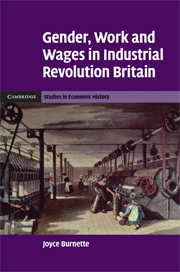Book contents
- Frontmatter
- Contents
- List of figures
- List of tables
- Preface
- Introduction
- 1 Women's occupations
- 2 Women's wages
- 3 Explaining occupational sorting
- 4 Testing for occupational barriers in agriculture
- 5 Barriers to women's employment
- 6 Occupational barriers in self-employment
- 7 Women's labor force participation
- 8 Conclusion
- Appendix to Chapter 3
- Appendix to Chapter 4
- Bibliography
- Index
5 - Barriers to women's employment
Published online by Cambridge University Press: 07 August 2009
- Frontmatter
- Contents
- List of figures
- List of tables
- Preface
- Introduction
- 1 Women's occupations
- 2 Women's wages
- 3 Explaining occupational sorting
- 4 Testing for occupational barriers in agriculture
- 5 Barriers to women's employment
- 6 Occupational barriers in self-employment
- 7 Women's labor force participation
- 8 Conclusion
- Appendix to Chapter 3
- Appendix to Chapter 4
- Bibliography
- Index
Summary
The pressure of male trade unions appears to be largely responsible for that crowding of women into a comparatively few occupations, which is universally recognized as a main factor in the depression of their wages.
Edgeworth, 1922Having presented models of market-based occupational sorting, and argued that in some portions of the labor market gender differences in occupations and wages were the results of differences in strength, this chapter turns to segments of the labor market where discriminatory barriers, rather than comparative advantage, kept women out of the best-paid occupations. I begin by examining cases where the predictions of the sorting models do not hold, and then move on to examine possible causes of the discriminatory barriers. I find that barriers were erected where men could use their market power to reduce competition in order to improve their own labor market outcomes. In this case occupational sorting benefited men and made women worse off, but increased competition would have reduced occupational sorting. The conclusions of this chapter thus support my general claims that the gender division of labor was driven by economic motivations, and that women benefited from competition.
Occupational sorting not based on strength
While the absence of women from some occupations can be explained by the strength requirements of the occupation, in many cases women were absent from occupations not requiring strength, suggesting that other forces must have been at work. Table 5.1 shows the prevalence of women in certain occupations in the 1841 census.
- Type
- Chapter
- Information
- Gender, Work and Wages in Industrial Revolution Britain , pp. 221 - 273Publisher: Cambridge University PressPrint publication year: 2008



